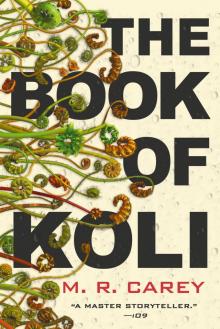- Home
- M. R. Carey
Fellside Page 8
Fellside Read online
Page 8
“We’re fine, Lizzie,” Grace told her. “You just relax and have a day off.”
Which sounded great but wasn’t really in Earnshaw’s repertoire. She didn’t read. Didn’t do drugs or religion. Wasn’t in film club or AA or the farm rota. Hadn’t had a girlfriend since Naz died. She had no leisure activities except remembering, and she really didn’t feel like remembering right then.
“I could tidy up a bit,” she suggested.
Grace looked at her as though she had offered to do an exotic dance. But maybe she saw something in Earnshaw’s face, because she nodded. “All right, go on. If you want to. But keep it quiet while I meditate.”
Grace meditating looked like Grace sprawled on a chair with her legs open and her eyes shut. Liz tiptoed around her, half-heartedly moving things from one end of a table or shelf to the other and then putting them back again. There was nothing to tidy. Grace had a place for every item she owned.
Liz started to slip into the past. She didn’t want to, but she did. She saw red. Blood soaked into streamers of trodden-down toilet paper. A crêpe-paper heart. The knuckles of her own hand, raw and ruined, after she’d punched the wall of her cell a hundred times.
“What did you say?” Grace asked.
Earnshaw’s thoughts scattered. “Nothing.”
“I thought you said you were sorry.”
“No.”
Grace sighed. “All right, Lizzie, enough of this. You’re not my maid. I’ve got a better job for you.”
“What do you need, Grace?”
Grace went over to the bookcase and took out a notebook. A fancy Moleskine that looked like a real book out of a library. “Last page,” she said, handing it over to Liz. “Bad debts. Go and see how many you can turn into good ones.”
Liz took the book with a big surge of relief and gratitude. “I’ll shake them up a little,” she promised.
“I’m sure,” Grace said.
“Grace?”
“Yeah?”
“Will McBride’s hands be okay?”
“Of course they will. McBride’s half-Irish, Lizzie. She was raised on that shit.”
The lilt of Grace’s voice and the grin that went with the words told Liz that that was a joke, so she laughed. And laughing about it made some of the bad feelings recede. She went out with a much lighter heart to do Grace’s bidding.
16
The next morning, the infirmary was in top gear. Dr Salazar was there for his early clinic and Patience DiMarta – “no nonsense on either side” – was back on as duty nurse.
Completing McBride’s transfer to Leeds was Salazar’s first order of business. Her hands were in a horrendous state, and she was likely to lose at least one finger, maybe two. Even splinting so many broken and pulverised bones went way beyond Sally’s expertise. Beyond Sylvie Stock’s too, very clearly: Sally undid her barely adequate dressings carefully and replaced the splints and bandages as best he could, but it was only a stopgap. McBride had to be moved, and quickly.
“And this was an accident?” he asked her. His tone was incredulous. He couldn’t help it.
“A table fell on me,” McBride mumbled.
Salazar turned her right hand – the worse of the two – very gently, so they could both see her knuckles. “These marks,” he said, pointing, “look like separate impacts. And they’re not even coming from the same angle. If a table—”
“It was just an accident, Sally,” McBride said. “My own stupid fault. Lots of people saw it.”
Salazar let it go. Once he would have pushed further. Taken the names of the other women who were supposed to have witnessed this accident and then questioned some of them to see whether their stories agreed. He might have filed an incident report. Even gone to the governor and asked for an investigation.
He didn’t do any of those things any more. Experience had beaten all that right out of him. But he still thought about doing them, as if to remind himself how big a gap there was between where he was and where he ought to be.
After the prisoner escort arrived and took McBride away, Salazar asked DiMarta to make up the quarantine room while he questioned Moulson (in one of her brief periods of full consciousness) about things like what day of the week it was and where she’d been born. He had to establish that she was of sound mind because otherwise – by some weird logic that had a lot more to do with law than medicine – her decision to kill herself couldn’t be allowed to stand.
Moulson passed on all counts. Salazar felt he didn’t do too badly either, in that he maintained his best bedside manner the whole time he was talking to her. Moulson’s face was like nothing he’d ever seen. Just like Sylvie Stock the night before, he tried to imagine what her injuries were like before she was operated on. They must have been terrible because reconstructive surgery had become something pretty close to magic in the last decade or so. You could grow new skin from stem cells and restore muscle function with microvascular transfers. If Moulson had received all these treatments and still looked the way she did, her face must have been burned to the bone.
But whatever she looked like, Salazar could find nothing wrong with her cognitive apparatus, therefore nothing to justify intervening in her slow-motion suicide. He and DiMarta had Moulson moved out of the main ward into the quarantine room (as per the governor’s instructions) by eleven o’clock. He asked Moulson if she’d consent to a visit from Fellside’s non-denominational pastor, Sarah Afanasy. Moulson declined, politely but firmly.
The quarantine ward was a little secure space all by itself, like a solitary cell in the heart of the infirmary. The pastor would have had to make a house call, because Moulson wasn’t going anywhere, even if she changed her mind about dying.
But she didn’t. She was still totally lucid when she was actually awake, and she refused – politely – all sustenance except water. DiMarta left her with a plastic pitcher and two plastic cups.
To Sally, the two cups seemed a bizarre touch. “She’s not going to be entertaining anyone,” he pointed out, joking.
The robust DiMarta was just a little outfaced for a moment. “You know,” she said, “I didn’t even think about it. It’s just automatic. Fill the jug, set out two cups. Isn’t it funny how much of what you do is… you know, not thinking about it?”
“The power of routine,” Sally agreed. He was very much aware of the phenomenon – of options silting up, doors rusting shut. Sometimes it seemed to him that every time he came to the point of a decision, it was pre-empted by a decision he’d already made years before. “We’re like robots, really. Not sophisticated ones, just kids’ toys. Moving in grooves that are already cut out.”
DiMarta was shocked. “I didn’t mean anything that depressing! I just meant that it’s easy to go into autopilot without realising it.”
Salazar protested that that was what he’d meant too, but he’d soured the conversation. He had no gift for banter.
He looked down at Moulson, who had fallen asleep again. Unable to think of anything to say that would lift the mood again, he fell back on physical comedy. He set out the two cups, filled both of them and pantomimed introducing Moulson to an imaginary guest.
DiMarta laughed out loud, but then clapped her hand to her mouth. “That’s not good,” she said between her fingers.
“What? What’s not good?”
She pointed to the two plastic cups. “That’s how you call the Coco. By pouring a glass of water or wine in front of an empty seat.”
“And what’s the Coco, exactly?”
“A monster that eats children and then takes their shape.”
“Lovely. This is a Portuguese thing, is it? I didn’t know you were superstitious, Patience.”
DiMarta shrugged her broad shoulders. “Autopilot,” she said. “I grew up with it. Every night my mother told me to go to bed without any fuss, or the Coco would come and get me.”
“And here you still are.”
“Yes. But I didn’t make a fuss. Or set a place at the table for ghos
ts.”
Salazar looked in on Moulson throughout the day. She came and she went, but generally she wasn’t strong enough to talk even when she was awake. He tried anyway, making meaningless conversation just to show her that he was there and to remind her that she was too. The worst thing about death was that it tended to be lonely, even when there were people around you. And this death was likely to be lonelier than most.
Starvation, in Sally’s purely theoretical understanding, was a complicated proposition. There was no smooth progression to it. It came on you bumpy and discontinuous like a cart bouncing over rocks. He talked it over with Patience, who would probably have to carry as much of the burden as he did.
“Starving isn’t abstinence from one thing; it’s abstinence from a whole lot of things. Mostly people only think about the big, obvious ones.”
“Calories.”
“Right. No calories, so you’ve got no energy to move. And no proteins for cell repair. But there are so many other things your body needs. We’re very complicated engines, Patience. We’ve got to have chloride for our stomach. Iodine for our thyroid gland. Electrolytes for our nervous system.”
“I don’t like thinking of a human being as a machine,” DiMarta tutted. “I wish you’d use a different metaphor.”
Sally registered the objection, but it was the only metaphor he had. “So all those different parts of you are going to have their own different emergencies, which will just come whenever they come. And then eventually you’ll reach catabolysis. You’ll start to feed on your own fat and then on your own muscle and tissue: your body will try to break itself down for parts.”
“I imagine it stops hurting at that point,” DiMarta said doubtfully.
Sally was going to do his best to make sure it didn’t hurt at all. Moulson had refused treatment, but he was allowed to give her pain relief, and since she was dying anyway, the sky was the limit. All the same, he wasn’t looking forward to seeing any of this, or managing it.
But it was part of his job, and he would do it to the best of his ability. At least, he hoped he would. He knew his own failings very well, and one of them was cowardice. There might well come a point when he was tempted to look away.
17
“A letter for you,” Nurse Stock said.
She set the cream-coloured envelope on Jess’s bedside table. Then stood and stared at it as though its presence there disturbed her in some way.
Most of the nurses treated Jess with wary detachment but Stock seemed to have an intense interest in her. She came into the quarantine ward quite often, even when there was nothing specific that she needed to do there, but almost never spoke a word.
“Thank you,” Jess murmured. She waited until the nurse finally went away before she opened the letter.
It was from Brenda, of course. And it wrung her heart, which was otherwise beyond wringing by this time. Jess had written to her aunt to explain about the hunger strike. It was one of the hardest things she’d ever done, but she couldn’t bear the thought of letting Brenda find out from the TV news. Brenda who had been her second mother, both before and after her real mother died. Who had called her my little jelly mould, and then my lovely Jess. Who had always loved her, no matter how unlovable she became.
This was Brenda’s response. Don’t put out that precious light, Jess. Whatever they say you’ve done, don’t throw yourself away. Not for someone else’s idea of crime or sinfulness. You know what you’ve done and what you haven’t done and you’ve only got to answer to yourself, not to them.
But that was precisely the problem.
Jess used the controls on the bed to lift herself halfway upright. She had a pad and a pen, which Nurse DiMarta had ordered from the commissary on her behalf. She used it now to scrawl an unsteady, spidery reply.
Don’t come to me. Don’t be hurt by me any more. I love you so much, but this is the best way for me. Don’t cry.
She sealed the letter, addressed it and put it on the table. The postage would be taken from her commissary credit, which was rapidly dwindling towards zero. But then again, so was she.
She fell asleep again, despite the harshness of the ward lights, and dreamed of nothing. Her next stop and final destination.
Sylvie Stock collected the letter and took it downstairs to drop it off in the box next to the admin station.
All mail from patients in the infirmary was handled in this way. It wasn’t special treatment exactly. Still, it rankled with her to be running errands for a child murderer.
She tore the letter up instead and flushed it down one of the staff toilets. It was a tiny thing, but it gave her a little transgressive thrill that she carried with her for the rest of the day.
“Could you please leave the lights off?” Jess asked Dr Salazar the next day or maybe the day after that. “They hurt my eyes.”
“I need them on when I examine you,” Salazar told her.
“I know, but… the rest of the time. When I’m alone.”
He did as she asked. And after that, there were no days or nights. There was just the darkness where she lived, and the signal flares that blinded her every time the doctor or the nurses came and vanished with them when they went.
Dr Salazar was dosing her with tramadol, because moving and swallowing was starting to hurt her now. The tramadol dulled the pain but it also made her dizzy and nauseous whenever she moved her head even slightly. It skewed her time sense too, unless that was a side-effect of not being able to see the sky any more.
Doing time, she thought inconsequentially. As though time were a drug.
If it was, she might have dosed herself more carefully.
18
“So this piece you’ve got in the infirmary,” Grace said to the Devil. “Moulson. What’s going on with that?”
She’d only just finished Devlin off about five seconds before and he was still out of breath, but he was used to Grace snapping back into business as usual right after sex, so he rolled over and lay back with his hands behind his head as she lit herself a cigarette. He could afford to relax. Liz Earnshaw and Big Carol Loomis were on duty at the door, and nobody was going to come in and interrupt them. Even if another warder came looking for him, they’d know better than to look under Grace’s skirts.
“She’s killing herself,” he told Grace with massive distaste. “The one way she can do it without any kickback. A hunger strike. We’ve just got to sit and watch, apparently.”
“It’s a protest?” Grace demanded, ignoring Devlin’s bitching as she usually did. The man had a lot of grievances. He lived in a world where everyone he met was keen to cheat or insult or disrespect or disobey him, or at all events to get away with something. He was, in his own mind, the bastion of order and the bastion of not taking any shit. Grace found him pliable to a fault as long as she didn’t attempt to challenge this cosmology.
That was part of what she liked about Devlin – or approved of, at least. There was almost nothing to him that you couldn’t take in at a glance. Thug was the first thing you would think when you saw him, and you weren’t likely to see anything later that would make you doubt your judgement. He was big and broad across the shoulders, kept his bullet-head meticulously shaved. More than anything else, he was hard. That was the impression he gave anyway; as though if you cut into him you’d find the same solid, massy substance all the way through.
That was the one place, though, where appearances did deceive. Devlin was a bully all right. Bullying, in Grace’s opinion, was a big part of who he was. But he had a sentimental streak too. He liked to believe that his junior warders were loyal to him, that the inmates respected him, that he was an emotional pivot for people he mostly treated with brusque disregard. To be loved and understood was the core of his fantasy life, which maybe went some way towards explaining how things worked between him and Grace. He saw an intimacy where she saw an alliance.
He considered Grace’s question and shrugged – not irritably, because he was still comfortably post-coital,
but dismissively. “No. She doesn’t think she was hard done by. Her lawyer asked if he could come in and talk to her about an appeal, and she said she didn’t want to see him.”
“Then what is she doing?”
“I don’t know. Got a bad conscience probably. She pleaded not guilty, but she fell apart at the trial and pretty much admitted she killed the kid.”
Grace didn’t have anything to say to this, but privately she thought that anyone who’d let themselves get destroyed by a sense of guilt was probably better off dead, and certainly wasn’t worth wasting any sympathy on. Guilt was one of the things she knew about but didn’t understand. It seemed to be as much use as hen’s teeth. If something was done, it was done. If you didn’t intend to do it, it wasn’t on you; if you did, you lived with your choice.
So Moulson was a queasy curiosity to her. But that was all she was, and the talk soon turned to other things. Grace had three new couriers to train up for drug runs, all with court appearances in the next couple of weeks. She wanted Devlin to arrange pick-ups for them. It was a lot of work, and it involved a lot of arguing back and forth about names, dates, times, locations and amounts. It was a pity they’d already had sex. This stuff got them both cheerful and excited again. But Devlin had a shift handover to deal with and he’d been in Grace’s cell for forty minutes already. Forty-five was a limit they’d agreed on a long time ago, and they stuck to it.
Devlin put his uniform back on, Grace giving his cock a squeeze before he put it away. Mixing up business and pleasure again, she let him in on a thought she’d had. “I think we could afford to up the volume.”
Devlin was far from enthusiastic. Grace had known he would be: that was why she’d waited until he was leaving to say this. The Devil preferred a quiet life in which money and gratification came to him easily, without his having to reach for them. “Where?” he demanded. “We’ve got the whole block to ourselves now. There’s no competition, Grace.”

 Fellside
Fellside The Girl With All the Gifts
The Girl With All the Gifts The Book of Koli
The Book of Koli The Boy on the Bridge
The Boy on the Bridge Someone Like Me
Someone Like Me